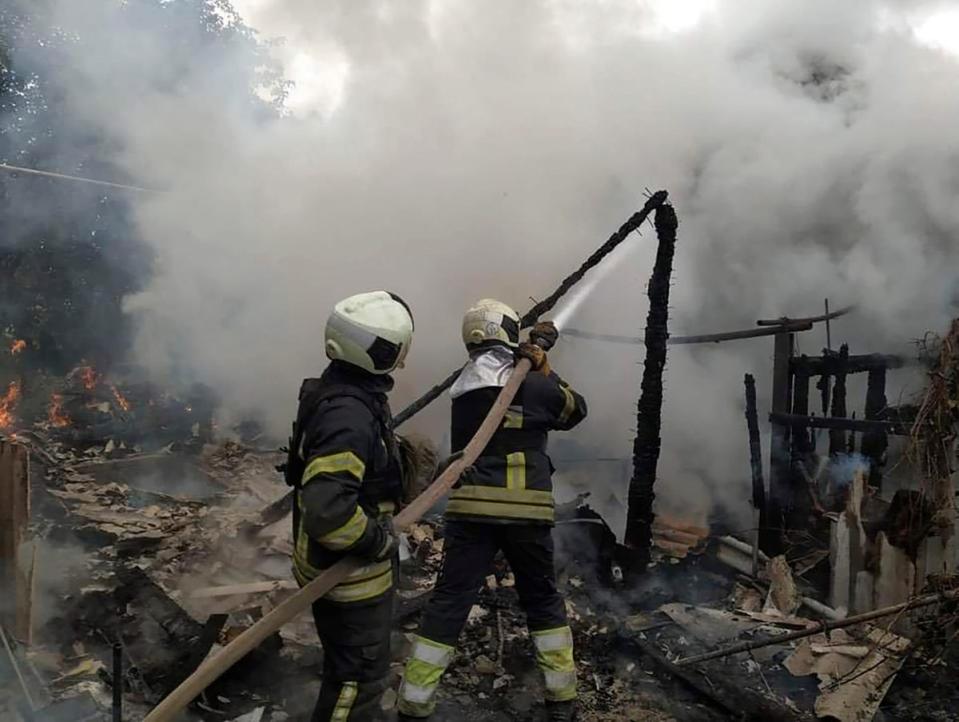Putin’s forces switch focus to Donetsk after capturing key Luhansk city

Vladimir Putin’s forces are switching their focus to capturing the Donetsk region of eastern Ukraine after seizing control of the region of Luhansk.
In its daily intelligence update on Monday morning, UK defence chiefs said Ukrainian forces were now likely to be falling back from Lysychansk to prepared defensive positions after Russia claimed to have secured full control of the key strategic city.
But with fighting in the Donbas intensifying in recent weeks, the UK Ministry of Defence said: “Russia’s focus will now almost certainly switch to capturing Donetsk Oblast, a large portion of which remain under the control of Ukrainian forces.”
Since abandoning an assault on the capital Kyiv in the early part of the war, Russia has concentrated its military operation on the industrial Donbas heartland that comprises the Luhansk and Donetsk regions, where Moscow-backed separatist proxies have been fighting Ukraine since 2014.
Ukraine President Volodymr Zelensky acknowledged, in his nightly address on Sunday, that his forces had pulled out of Lysychansk but remained defiant, warning Russia he would use a new supply of modern weapons from western allies to repel Putin’s troops.
“If the commanders of our army withdraw people from certain points at the front, where the enemy has the greatest advantage in firepower, and this also applies to Lysychansk, it means only one thing,” Mr Zelensky said.
“That we will return thanks to our tactics, thanks to the increase in the supply of modern weapons.”
Confirming the latest major development in the Donbas, the MoD added: “Ukrainian forces have withdrawn from Lysychansk likely falling back to prepared defensive positions.
“Russia’s Ministry of Defence had earlier claimed to have completed the encirclement of Lysychansk and secured full control of the city. The city was the last remaining major population centre in Luhansk Oblast under Ukrainian control.
“Fighting in and around the city in Luhansk Oblast has intensified over the past week with Russian forces making steady progress.
“The fight for the Donbas has been grinding and attritional and this is highly unlikely to change in the coming weeks.”
Russian Defence Minister Sergei Shoigu informed President Putin that Luhansk had been "liberated", the defence ministry said, after Russia earlier said its forces had captured villages around Lysychansk and encircled the city.
West of Lysychansk in Donetsk region, at least six people were killed when the Ukrainian city of Sloviansk was hit by powerful shelling from multiple rocket launchers on Sunday, local officials said.
While Russia would try to frame its advance in Luhansk as a significant moment in the war, it came at a high cost to Russia's military, said Neil Melvin of the London-based think tank RUSI.
"Ukraine's position was never that they could defend all of this. What they've been trying to do is to slow down the Russian assault and cause maximum damage, while they build up for a counteroffensive," he said.
Meanwhile the MoD said Ukraine’s food exports in 2022 are unlikely to be more than 35 per cent of their 2021 total due to Russia’s invasion.
It said in its daily briefing: “With harvest underway, Russia’s invasion continues to have a devastating impact on Ukraine’s agricultural sector. The war has caused major disruption to the supply chains of seed and fertiliser which Ukrainian farmers rely on.
“Russia’s blockade of Odesa continues to severely constrain Ukraine’s grain exports. Because of this, Ukraine’s agricultural exports in 2022 are unlikely to be more than 35% of the 2021 total.
“Following its retreat from the Black Sea outpost of Snake Island, Russia misleadingly claimed that ‘the ball is now in Ukraine’s court’ in relation to improving grain exports.
“In reality, it is Russia’s disruption of Ukraine’s agricultural sector which continues to exacerbate the global food crisis.”

 Yahoo News
Yahoo News 